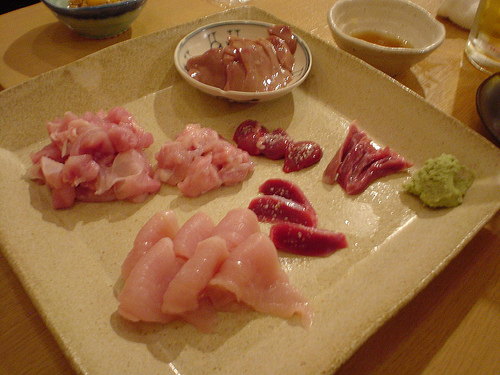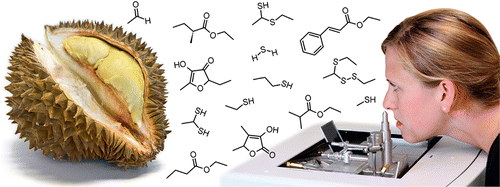Food
Tsongsul, or Feces Wine
According to rocketnews24.com, there's a Korean drink called Tsongsul, which translates as "feces wine." It's made by mixing oven-baked feces (chicken, dog, or human) with distilled grain alcohol. Some medicinal herbs and cat bones are thrown in as well. Then the whole evil concoction is left to ferment for 3 to 4 months.
People drink this in the hope that it'll cure whatever illness they might have, not for fun. However, I can't find any sources that independently confirm there really is such a drink, but Korean sources are hard to check. So I'm going to take their word for it.
This wine might pair nicely with urine bread!
rocketnews also has a photo series of a bunch of women actually drinking this stuff.

Posted By: Alex - Fri Jan 04, 2013 -
Comments (16)
Category: Food, Excrement, Alcohol
Pay It Forward—For Three Hours
When someone paid for the order behind them, customers at Tim Horton's drive-thru paid it forward -- for Three Hours!!Here's the story --
Please pay for me the next time I'm getting fast food!!
Posted By: gdanea - Sun Dec 30, 2012 -
Comments (1)
Category: Food
Eating Raw Chicken
If you plan to serve a chicken dinner over the holidays, save yourself some time and serve it raw. Call it Chicken Sashimi, which is a Japanese delicacy, and is basically raw chicken. (image via geoffmackay.com)
According to a writer in Esquire, raw chicken isn't actually more dangerous than any other raw meat:
But first, there was the small matter of salmonella. I spoke with a number of poultry scientists and discovered that while it's plausible that salmonella (a bacterium that, by the way, is hardly unique to chickens) could show up on a chicken's skin and contaminate cutting boards, the chances that it works its way inside a muscle, like the breast, all by itself? Very, very slim, and really no different from the odds of E. coli camping out in a medium-rare steak. The Centers for Disease Control has documented five salmonella outbreaks this year, none of which involved eating chicken.
To be clear: ingesting almost anything involves a certain level of risk. But if you've ever eaten supermarket cold cuts, potato salad at a steamy August cookout, or any food while vacationing in Mexico, pink chicken should rest squarely within your food-safety comfort zone.
Next time you order chicken at a restaurant, ask for it medium rare and see how the waiter reacts.
Posted By: Alex - Sat Dec 22, 2012 -
Comments (3)
Category: Food
Gingerbread AT AT
This bakery gets my vote for most creative gingerbread
Here's the link to the bakery in California.
http://www.blackmarketbakery.com/index.php/press/article/18
For the Harry Potter fans of gingerbread creativity, here's the Weasley family home, known as "The Burrows." Made with over 200 pieces, the house took Michelle Jamieson more than a week to cobble together.
!

Here's the link to this and other (White House, Angry Birds, Eiffel Tower) gingerbread creations.
http://bites.today.com/_news/2011/12/22/9611093-check-out-these-over-the-top-gingerbread-houses
Merry Christmas!! Unless you'd rather have a Happy Holiday!
Posted By: gdanea - Tue Dec 18, 2012 -
Comments (3)
Category: Food
Puking Kitty Gravy Boat
Made by GingerEla, who's now raising money on Kickstarter in order to sell these to the general public. Pledge $35 or more to her Kickstarter campaign, and one of these will be yours if she meets her campaign goal of $14,000. She's almost halfway there, with 15 more days to go.
Posted By: Alex - Thu Dec 13, 2012 -
Comments (4)
Category: Art, Food, Cats
How To Carve An Elephant
An illustration for this purpose can be found in a sixteenth-century edition of De Arte Coquinaria (On the Subject of Cooking).
A 1905 article in the Strand magazine provides more info about this work:
The work is divided into ten books, beginning with soups, pickles, and sauces, and proceeding through the whole art of cookery, with hundreds of recipes, the very reading of which makes one's mouth water. For instance, who could resist "virgin sow drest with broth made of pepper, wine, honey, oyl, and stew'd damsons"? Or dormouse sausages? ...
There are many recipes in the book to dress "cramp-fish, that numb the hands of those that touch them; the cuttlefish, whose blood is like ink; the pourcontrel, or many feet, the sea-urchin or hedgehog." ...
Then, again, we are given minute instructions for the carving of beasts whose flesh was esteemed by the ancients. "In partes of Asia and Africa," we are told, "the oliphant is eaten, not as the Romans and Egyptians were wont to do, sparingly and only as pertain'd to his feete, trunk, and tayle all of which were great delicacies, but his entire carcase is carved and consumed." For the benefit of those who might happen to possess an elephant and be tempted to eat him a chart of carving instructions accompanies the text.
Posted By: Alex - Wed Dec 12, 2012 -
Comments (5)
Category: Animals, Food, Books, Sixteenth Century
Bacon Möbius Strip
Would pair nicely with the Bagel Möbius Strip, except that unfortunately it's not real bacon, but rather some kind of non-edible plastic resin. It's for sale over at shapeways.com for $19.
Posted By: Alex - Mon Dec 10, 2012 -
Comments (4)
Category: Art, Food, Bacon
Prince Ranjit, King of Curry


Even in this current age of celebrity chefs, no one has thought to impersonate a foreign Rajah in order to attract publicity for his restaurant, like "Prince Ranjit" did a century ago.
Full story here.
Original article here.
Posted By: Paul - Fri Dec 07, 2012 -
Comments (3)
Category: Eccentrics, Food, Hoaxes and Imposters and Imitators, Restaurants, 1900s, India
Historic Explosions in Cauliflower
By artist Brock Davis who, based on his other projects, likes to play with his food.
Space Shuttle Challenger

Nagasaki

Hindenburg
Posted By: Alex - Thu Dec 06, 2012 -
Comments (2)
Category: Art, Food, Vegetables
What Makes Durian Stinky?
Durian is reputed to be the stinkiest fruit in the world, so researchers at the German Research Center for Food Chemistry recently set out to find out exactly what makes it so malodorous. They write in the Journal of Agricultural and Food Chemistry:
Their investigation involved a) shipping Durian by air freight from Thailand to Germany; b) extracting pulp from the fruit; and then c) analyzing the pulp by means of a "Trace GC Ultra gas chromatograph" equipped with a "tailor-made sniffing port":
This effort yielded "several new aroma compounds with interesting odors," but the authors of the study caution that further investigations are still required in order to "unequivocally assess the contribution of individual odorants to durian aroma."
Posted By: Alex - Sun Dec 02, 2012 -
Comments (7)
Category: Food, Science, Experiments

| Who We Are |
|---|
| Alex Boese Alex is the creator and curator of the Museum of Hoaxes. He's also the author of various weird, non-fiction, science-themed books such as Elephants on Acid and Psychedelic Apes. Paul Di Filippo Paul has been paid to put weird ideas into fictional form for over thirty years, in his career as a noted science fiction writer. He has recently begun blogging on many curious topics with three fellow writers at The Inferior 4+1. Contact Us |




